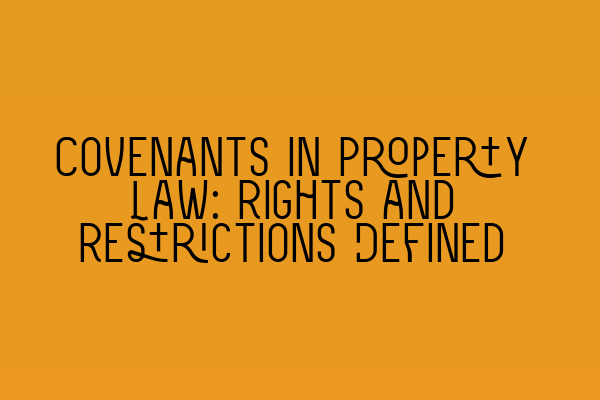Covenants in Property Law: Rights and Restrictions Defined
Introduction:
Welcome to the SQE Property Law blog, where we provide expert insights and guidance on various aspects of property law. In this article, we will delve into the concept of covenants, which are an integral part of property law. We will explore the rights and restrictions associated with covenants, how they are defined, and their implications for property owners and purchasers.
What are Covenants?
In property law, covenants refer to legal agreements or promises made between parties with an interest in a particular property. These covenants can impose rights and restrictions on the use and enjoyment of the property. Covenants are commonly found in property deeds, leases, and other legal documents that govern the rights and responsibilities of property owners.
Types of Covenants:
There are two primary types of covenants: positive covenants and restrictive covenants.
Positive covenants are obligations or promises to do something on the property. For example, a positive covenant may require the property owner to contribute to the maintenance of a shared driveway or to provide regular upkeep of communal gardens. These positive covenants aim to ensure the proper functioning and maintenance of common areas shared by multiple property owners.
Restrictive covenants, on the other hand, impose limitations or prohibitions on certain activities or uses of the property. These covenants can restrict the construction of additional buildings, the alteration of the property’s appearance, or the use of the property for specific purposes. Restrictive covenants are intended to protect the interests of property owners and maintain the value and desirability of the surrounding properties.
Enforcement of Covenants:
Covenants are legally binding agreements, and their enforcement can vary depending on the jurisdiction and the circumstances. In some cases, covenants may be enforceable by legal action, allowing affected parties to seek remedies if a covenant is breached. However, not all covenants are enforceable indefinitely, as certain time limitations may apply.
When purchasing a property, it is crucial to conduct thorough due diligence to ensure compliance with any existing covenants. Failure to adhere to these covenants may result in legal disputes or financial penalties. Engaging the services of a solicitor who specializes in property law can provide invaluable guidance throughout the process.
Impact on Property Value and Potential Buyers:
Covenants can have a significant impact on the value and marketability of a property. Positive covenants that ensure the maintenance of communal areas and shared facilities can enhance the desirability of a property, making it more attractive to potential buyers. On the other hand, restrictive covenants may limit certain activities or uses of the property, which can either preserve the character of the area or restrict the potential scope of development.
Before purchasing a property, it is essential to review the existing covenants to understand their implications fully. An experienced solicitor can assist in assessing the potential impact on property value and advise on any contingencies or negotiations that may be necessary.
Conclusion:
Covenants play a crucial role in property law, defining the rights and restrictions associated with a particular property. Positive covenants require property owners to undertake specific obligations, while restrictive covenants impose limitations on the use and development of the property. Understanding and complying with these covenants is essential to avoid legal issues and to protect the value of your property.
If you want to test your knowledge of contract law, we invite you to try our interactive SQE mock tests for contract law. To further enhance your understanding of contract law, consider joining our SQE contract law webinars, which provide expert insights and guidance. You may also be interested in reading our article on contract law reforms, analyzing recent changes, or exploring the rights and responsibilities of parties in a contract. Lastly, don’t forget to check out our comprehensive guide on the importance of ethics in contract law.
For any legal assistance or advice regarding covenants or any other aspect of property law, please don’t hesitate to contact SQE Property Law & Land Law – your trusted experts in property law.
